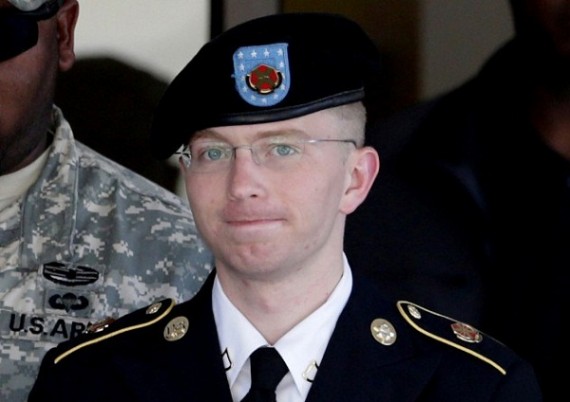Bradley Manning Acquitted Of ‘Aiding The Enemy,’ Could Still Face Up To 136 Years In Prison
Bradley Manning was acquitted of the most serious charge against him, but is still likely to spend most of his life in prison.
Private Bradley Manning was acquitted of the most serious charge against him, but was convicted on several Espionage Act related charges and still faces the possibility of spending the rest of his natural life in prison:
WASHINGTON — A military judge on Tuesday found Pfc. Bradley Manning not guilty of aiding the enemy, but convicted him of multiple counts of violating the Espionage Act.
Private Manning had already confessed to being WikiLeaks’ source for a huge cache of government documents, which included videos of airstrikes in which civilians were killed, hundreds of thousands of front-line incident reports from the Afghanistan and Iraq wars, dossiers on men being held without trial at the Guantánamo Bay prison, and about 250,000 diplomatic cables.
But while Private Manning had pleaded guilty to a lesser version of the charges he was facing, which could expose him to up to 20 years in prison, the government decided to press forward with a trial on a more serious version of the charges, including “aiding the enemy” and violations of the Espionage Act.
Beyond the fate of Private Manning as an individual, the “aiding the enemy” charge — unprecedented in a leak case — could have significant long-term ramifications for investigative journalism in the Internet era.
The government’s theory was that providing defense-related information to an entity that published it for the world to see constituted aiding the enemy because the world includes adversaries, like members of Al Qaeda, who could read the documents online.
Further details from Business Insider:
Military judge Col. Denise Lind convicted Manning of 19 other charges, including five counts of violating the espionage act.
In all, Manning faces a maximum sentence of 136 years in prison.
Alexa O’Brien, who detailed each count, is listing the specific counts and the verdicts.
Manning previously pleaded guilty to 10 of the lesser offenses and faced up to 20 years.
Sentencing will commence tomorrow at 9:30 a.m., according to The Washington Post.
The “aiding the enemy” charge was always the most difficult charge that the prosecution had made against Manning in this case because it required the government to prove that, when he provided the classified documents at issue in the case to Wikileaks, he knew that they would eventually wind up in the hands of al Qaeda or other enemies of the United States. At trial, there was evidence presented at some of the materials that Manning had provided to Wikileaks, and which Wikileaks then posted on its website, were found among the cache of information that was retrieved from Osama bin Laden’s lair in Abbottobad, Pakistan after the May 2011 raid that resulted in the al Qaeda leader’s death. The prosecution argued that this alone was sufficient evidence to support a conviction under the act and that Manning either knew or should have known that the information he was providing to Wikileaks would eventually wind up on the Internet, where it would be accessible to terrorist groups. The defense, as well as many outside of the case itself, argued strongly against this position:
Defense attorney David Coombs argued that all modern cases regarding aiding the enemy involved military members who gave the enemy information directly.
Some experts, including Harvard Law Professor Yochai Benkler, argued that the aiding the enemy charge in Manning’s case “will cast a long shadow on national security journalists and their sources.”
That’s because the prosecution said that it would have made the same case if Manning had leaked the documents to The New York Times, Washington Post, or Wall Street Journal.
Here’s how Benkler broke it down:
The source gives materials to the journalist; the journalist publishes; the enemy reads the publication and, presto, the source is guilty of the offense of “aiding the enemy”.
The prosecution’s argument that Manning aided an enemy of the United States by providing information to a third-party was always a tenuous argument at best, especially in the context of a criminal charge that could have potentially led to Manning spending the rest of his life behind bars without possibility of parole. I’ve got little grief for Bradley Manning, he went into this fully aware of what he was doing and that it was illegal under several provisions of the UCMJ and other applicable laws. However, the argument that he acted with the intent of “aiding the enemy” by providing the information to a third-party publisher was simply too far of a leap of facts, especially given the fact that the prosecution argued that it didn’t matter if Manning had leaked the material to Wikileaks or a well-respected newspaper or other news organization. The precedent that such a conviction would have set, in both the military and civilian justice systems, would have arguably had a significant chilling effect on national security investigative journalism, which has already taken a significant hit thanks to the Obama Administration’s crackdown on leaks and its investigation of journalists.
The case now moves on to the sentencing phase, which will involve both prosecution and defense presenting yet further evidence for the Court to consider before sentence is imposed. As noted, the maximum sentence that Manning faces on the charges that he has been convicted of or pled guilty to amounts to some 136 years. While that might seem excessive given that he’s been cleared of the most serious charge, it does seem appropriate that he spend some serious time in prison for stealing thousands of documents with little regard for the secrets he was revealing and handing them over to a third-party whose motives he had no awareness of. Some will consider Bradley Manning a hero, but he’ll always be a convicted criminal and that seems about right.







Exactly the point I have been trying (to little avail) to impress upon people on other forums. The aiding charge (IMLO) was always a stretch, but the totality of the other charges filed against him (which AFAICT all resulted in conviction) amount to a de facto life sentence even at a 50% of maximum rate.
They are trying to portray that one exoneration as a victory, but it’s a pyrrhic one from Manning’s perspective.
It’s a pyrrhic victory for Manning, yea, but I think important legally nonetheless.
The one thing I’m unclear on is how much sentencing discretion a judge in a military trial has, and what Manning’s parole eligibility might be at a future date.
@Doug Mataconis:
Alexa O’Brien has been tweeting the fine details for quite some time. According to her, most if not all of the charges have no minimum penalty, so the Judge would be perfectly within their rights to sentence him to as little as time served.
@Doug Mataconis: It’s been 18 years since I was a military prosecutor, but unless things have changed a lot, they generally have a pretty wide latitude on sentencing. And, after the judge hands down the sentence, the convening authority has the ability to reduce or even set aside the conviction. Not saying the CA would do such a thing, more if a “the sentence could end bring anything” point.
I find the standard for aiding the enemy confusing and inconsistent:
Here is a previous report that Doug posted on earlier:
But today, several of the reports, including Doug’s summary above, as well as in other places (examples here and here,) state that the government tried to prove Manning “should have known” that the information would get to enemies.
It seems like some of the coverage is flat out wrong, or not picking up a subtle but important distinction between actual and constructive knowledge.
Some of you may have noticed that I hold sort-of-liberal views…and I never was a fan of the Bush/Cheney war of choice…but I have a hard time seeing Manning as a hero.
We’ll see where the Military Judge comes down…but this seems about right to me.
@David in KC: Here’s one that just occurred to me: does the CA have the authority to _increase_ the sentence as well, or only decrease?
@legion: No. He can’t increase the sentence.
17 years, reduction to E-1 and a dishonorable discharge with credit for time served —- my guestimate based on his crimes, immaturity, ability to still become a member of society down the road etc… i would imagine the sentencing hearing will take a week or so.
@Mike: For me, something in the area of 20 years seems appropriate, give or take. The main factor for me is what is the number of years that would be a sufficient deterrent to future Mannings and I imagine that most would have difficulty comtemplating a generation behind bars. I doubt there would be much incremental deterrent effect from doubling that sentence.
Manning is small, looks weak, is gay I believe, and will be seen as a traitor rather than a more “honorable” thief or murderer. So multiply whatever sentence he receives by three. By the time he’s done he’ll be destroyed as a human being. Don’t kid yourselves: he can’t do a year and emerge as anything like the person he was.
Greetings:
I seem to remember a Lenny Bruce bit about the inanity of locking up male homosexuals in men’s’ prisons, but I’m not the type to call this a DADT success story with any great deal of seriousness. Like the Jesuits taught me, sometimes it’s what they say, and sometimes it’s what they don’t say.
I love the sound of 136 years in the morning. It sounds like VICTORY.
Darn! Just when I was looking forward to the rebirth of the firing squad!